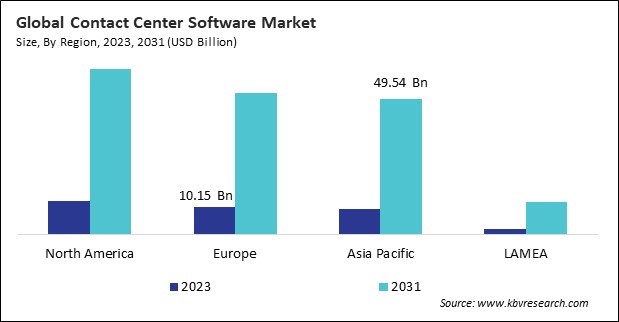According to a new report, published by KBV research, The Global Cognitive Security Market size is expected to reach $117.84 billion by 2031, rising at a market growth of 31.3% CAGR during the forecast period.
The On-premise segment exhibits a CAGR of 31.8% during (2024 - 2031). Sectors like banking, healthcare, government, and defense prefer on-premise cognitive security solutions to ensure complete control over sensitive data and critical IT infrastructure. Organizations with strict data residency requirements and those operating in highly regulated environments opt for on-premise deployments to comply with industry-specific regulations such as GDPR, HIPAA, and PCI-DSS. Moreover, businesses with large-scale existing IT infrastructure rely on on-premise security solutions to maintain data sovereignty, minimize third-party risks, and achieve customized security configurations.

The Solution segment dominated the Global Cognitive Security Market by Component in 2023; thereby, achieving a market value of $71.36 billion by 2031. Businesses across industries invest in advanced cognitive security solutions such as AI-driven endpoint security, cloud security, and network security to mitigate ransomware, phishing, and advanced persistent threats (APTs). The rapid shift towards digital transformation, IoT adoption, and cloud computing has further heightened the demand for automated security solutions capable of handling large-scale cybersecurity challenges.
The Small & Medium-Sized Enterprises (SMEs) segment captured a CAGR of 32% during (2024 - 2031). Many SMEs lack in-house cybersecurity expertise and dedicated IT teams, making them vulnerable to phishing attacks, malware, and data breaches. To counter these risks, SMEs are turning to AI-driven security solutions that offer cost-effective, automated threat detection and compliance management. The rise of cloud-based cognitive security platforms has simplified adoption, allowing SMEs to scale their cybersecurity defenses without heavy upfront investments.
The Anomaly Detection & Risk Mitigation segment is leading the Global Cognitive Security Market by Application in 2023; thereby, achieving a market value of $32.07 billion by 2031. The growing sophistication of cyberattacks, insider threats, and fraud attempts has made real-time anomaly detection a critical component of modern security strategies. Cognitive security solutions equipped with machine learning algorithms can identify suspicious patterns, unusual access requests, and unauthorized system activities, helping organizations take immediate action against potential threats.
The IT & Telecom segment is experiencing a CAGR of 32.4% during (2024 - 2031). With high data traffic and widespread remote work adoption, telecom companies must secure their network infrastructure against DDoS attacks, insider threats, and cyber espionage. AI-powered network security solutions, automated intrusion detection, and real-time anomaly detection have become essential for ensuring secure data transmission and protecting communication networks. The adoption of zero-trust security models, cloud-native cybersecurity solutions, and endpoint detection & response (EDR) platforms is further propelling market growth in the IT & telecom sector.
Full Report: https://www.kbvresearch.com/cognitive-security-market/
The North America region dominated the Global Cognitive Security Market by Region in 2023; thereby, achieving a market value of $42.13 billion by 2031. The Europe region is expected to witness a CAGR of 30.7% during (2024 - 2031). Additionally, The Asia Pacific region would register a CAGR of 32% during (2024 - 2031).
By Deployment Mode
By Component
By Enterprise Size
By Application
By Industry Vertical
 Unique Offerings
Unique Offerings